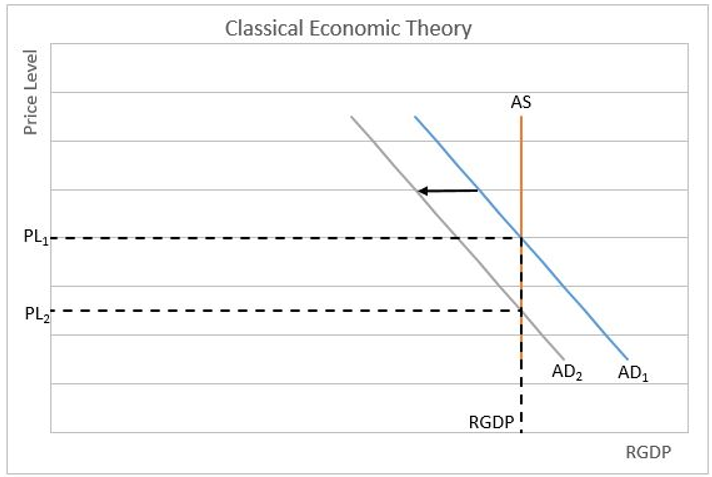Classical Economics
View FREE Lessons!
Definition of Classical Economics:
Classical economics asserts that economies are self-correcting and function best with minimal government intervention.
Detailed Explanation:
Classical economists advocate for laissez-faire economics, favoring minimal government intervention in managing the economy. They believe in the “invisible hand,” a concept introduced by
Adam Smith, which theorizes that the economy naturally adjusts to supply demands at the lowest prices and most efficiently. With a long-run perspective, classical economists acknowledge the inevitability of business cycles but view them as self-correcting, requiring little government intervention.
Classical economic theory is often illustrated with a graph where economic output is determined solely by an economy’s factors of production, or available resources. In this framework, aggregate output (aggregate supply) remains unchanged regardless of price level fluctuations, resulting in a vertical aggregate supply curve (AS), which indicates that any change in aggregate demand (AD) leads to a corresponding change in the price level to maintain economic equilibrium.

Classical economists know that unemployment increases during the trough of a business cycle. The central question is, “What is the best way to respond?” With a long-run perspective, classical economists recognize the costs of government spending. They argue that government spending diverts capital from other investments, and taxes take money directly away from households and businesses, reducing their ability to make purchases within their means. Additionally, if the government borrows to finance its needs, the increased demand for money leads to higher interest rates, which “crowd out” private sector investments.
The classical economist’s approach to managing the economy contrasts sharply with
Keynesian economics, which advocates for government intervention to manage aggregate demand and flatten business cycles. According to Keynesian economists, the government should spend more and cut taxes to stimulate the economy during recessions, even if it means incurring debt to increase aggregate demand.
Dig Deeper With These Free Lessons:
Fiscal Policy – Managing an Economy by Taxing and Spending
Monetary Policy – The Power of an Interest Rate
Business Cycles
Factors of Production – The Required Inputs of Every Business
Causes of Inflation
